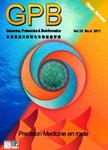Proteomics Technologies and Challenges
Proteomics Technologies and Challenges作者机构:Department of Clinical Oncology Queen Elizabeth Hospital
出 版 物:《Genomics, Proteomics & Bioinformatics》 (基因组蛋白质组与生物信息学报(英文版))
年 卷 期:2007年第5卷第2期
页 面:77-85页
核心收录:
学科分类:0710[理学-生物学] 1001[医学-基础医学(可授医学、理学学位)] 08[工学] 09[农学] 0714[理学-统计学(可授理学、经济学学位)] 0703[理学-化学] 0901[农学-作物学] 0836[工学-生物工程] 0701[理学-数学] 090102[农学-作物遗传育种] 0812[工学-计算机科学与技术(可授工学、理学学位)]
主 题:proteomics mass spectrometry, protein chip
摘 要:Proteomics is the study of proteins and their interactions in a cell. With the completion of the Human Genome Project, the emphasis is shifting to the protein compliment of the human organism. Because proteome reflects more accurately on the dynamic state of a cell, tissue, or organism, much is expected from proteomics to yield better disease markers for diagnosis and therapy monitoring. The advent of proteomics technologies for global detection and quantitation of proteins creates new opportunities and challenges for those seeking to gain greater understanding of diseases. High-throughput proteomics technologies combining with advanced bioinformatics are extensively used to identify molecular signatures of diseases based on protein pathways and signaling cascades. Mass spectrometry plays a vital role in proteomics and has become an indispensable tool for molecular and cellular biology. While the potential is great, many challenges and issues remain to be solved, such as mining low abundant proteins and integration of proteomics with genomics and metabolomics data. Nevertheless, proteomics is the foundation for constructing and extracting useful knowledge to biomedical research. In this review, a snapshot of contemporary issues in proteomics technologies is discussed.



